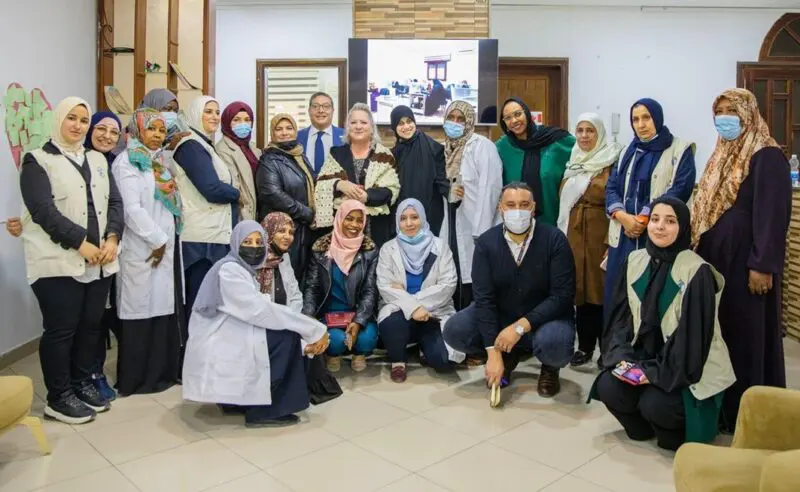Canada and UNFPA continue to support women in Libya

A high-level Canadian delegation led by H.E. Ms. Isabelle Savard, Canadian Ambassador to Libya visited UNFPA’s project sites in Tripoli. She was accompanied by Mr. Samir Anouti, UNFPA’s Country Representative to Libya along with other officials. “While Libya transits from conflict and volatility to potential peace and stability, this is the high time we divert our attention to the most vulnerable segments including women and girls in the country.
Building the capacities for improved reproductive health service delivery and safeguarding women and girls from different forms of violence will yield long term dividends”, said Ms. Isabelle Savard.
Since 2017, the Canadian government has provided extensive support to UNFPA for its humanitarian interventions focusing on sexual and reproductive health, gender-based violence (GBV) and COVID-19 response, through various interventions. “In connection with the International Women’s Day, I express the commitment of the government of Canada to stand by UNFPA in its pursuit for a healthy and violence-free future for women and girls in Libya”, the Ambassador added.
Ms. Savard visited Weryemma Polyclinic in Tripoli which was supported by the Canadian government through equipment and supplies after the area was hit by the conflict in 2019. The facility is providing reproductive health services, including lifesaving emergency obstetric and newborn care services, and other medical support. Every day, around 60 patients including migrants and refugees are assisted at the polyclinic. Along with the beneficiaries, the Ambassador also met with the health staff previously trained by Canada’s support, and got information about the current capacity issues due to increased needs of health services in Libya.
Later, the delegation visited UNFPA’s Women and Girls Safe Space (WGSS) in Gurji, Tripoli. Canada’s support has been crucial to ensure the provision of GBV prevention and response services in the WGSS, including psychosocial support services, life skills/livelihood training sessions, GBV awareness raising sessions and distribution of dignity kits. In total, UNFPA supports four Women and Girls Safe Spaces in Benghazi, Sabha and two in Tripoli. The Safe Spaces have been used as entry points to detect cases of survivors of GBV and are visited by a large number of beneficiaries including migrants, refugees and from other vulnerable groups on a daily basis. The Ambassador also witnessed different activities regarding the International Women’s Day and congratulated staff and women beneficiaries present on the occasion.
“I am thankful to Her Excellency Ms. Isabelle Savard for visiting us today and to the Canadian government for its unwavering support to UNFPA in Libya and globally. We have been generously supported by Canada since the time of crisis and together we are able to provide lifesaving reproductive health services and vital GBV response to women and girls in Libya,” said Mr. Samir Anouti on the occasion.
“Libya has a demographic dividend that could contribute to accelerate the pace of attaining its sustainable development goals particularly through improved reproductive health and youth friendly services that will enable Libyan youth and women to realize their full potential. I am quite hopeful that as per this vision as well as this year’s theme of International Women’s Day, Canada will maintain its valuable support that is contributing to the achievement of a sustainable future for Libyans especially women and youth” Samir added.
How to submit an Op-Ed: Libyan Express accepts opinion articles on a wide range of topics. Submissions may be sent to oped@libyanexpress.com. Please include ‘Op-Ed’ in the subject line.
- AU pushes for lasting truce after Tripoli clashes - May 24, 2025
- Libyan entities dispute financial transfer allegations - May 24, 2025
- Amnesty demands release from Sudan’s Tripoli embassy - May 24, 2025


